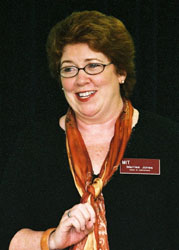|
|
| |
 There are two issues relating to the college
application process pervading my thoughts at this
moment: the pressure on prospective students and
their parents as they approach the final year of high
school – then wait out the college decisions; and
the primacy of the SAT and ACT as a gatekeeper
within that process.
There are two issues relating to the college
application process pervading my thoughts at this
moment: the pressure on prospective students and
their parents as they approach the final year of high
school – then wait out the college decisions; and
the primacy of the SAT and ACT as a gatekeeper
within that process.
The pressure is at its height during the next few
weeks for seniors, as the notifications of yea or nay
are close at hand. My thoughts are with you, wishing
you only yeas.

The SAT, already in the
forefront of the minds of all rising seniors, has
become headline news with its faulty scoring debacle
dating back to the October 2005 test. Reliance on
these tests is questionable at best, but highly
suspect in the face of this scoring catastrophe. Yet,
the scores on these tests are a baseline criteria: for
students to use in selecting colleges; and for
colleges to use in accepting students.
In this issue of my newsletter, I would like to include
excerpts from articles written by two college
administrators: the first is by Marilee Jones, Dean of
Admissions @ MIT, also the mother of a senior in high
school; the second is by Joanne V. Creighton,
president of Mount Holyoke College. Dean Jones
addresses the pressures for prospective students.
President Creighton discusses the SAT as a
gatekeeper.
|
| |
| |
| |
| Article Excerpts |
| |

From Dean Jones:
-- My
beautiful daughter - the love of my life - is a senior
applying to college this year and I am just horrified
by the pressures inherent to the admissions process
everywhere. Horrified as both a mother and a dean
who has dedicated her professional life to education,
choosing to leave a life of research science long ago
to become a gatekeeper for those who could really
make a difference in this world. --
-- It's actually sickening to me now because as I
stand off and observe as a mother, I see how often
the message we adults send to young people is that
they are not good enough as they are, that if only
they were more involved, took more AP courses,
cured cancer already, they would make a better
applicant. I really feel that my generation has failed
you by failing to act like adults, by failing to just tell
the truth about what we do and why, by expecting
you at your age to be what we still can't be at ours -
perfect. --
-- I want more than anything for my daughter to be
admitted everywhere so she will not feel that sting of
rejection so familiar to me at my age and level of
experience (you don't get to be Dean of Admissions
without some bruises along the way), but as a
pragmatic dean, I know that she will probably get
some rejections because of the laws of probability.
After all, you are all at the crest of the huge
demographic bubble, applying to many more schools
than students used to, so everyone's probability of
acceptance goes down. Ugh. Sometimes the truth is
so ugly. --
-- We adults all know that where you go to college
does not make your life in America - you make your
life through your choices and intentions. This is not
cliché -- it is really true. The best people I have ever
worked with - the smartest, the most creative, the
most resourceful - did not go to Ivy League schools
or the MITs of the world. Many went to schools you
have never heard of --
-- I suggest that you see the college admissions
process for what it really is - an initiation or rite of
passage into adulthood. In an initiation you are
saying to the world in a public way, "I am ready to
be an adult and I will prove it now".
Think about it -- through the college admissions
process, you are reducing the complexity of your
essence and experience to fit a fixed format on a
handful of pages, exposing yourself to strangers who
will judge you using arcane rules you will never
understand, you will be forced to hold your anxiety
for many weeks while you are expected to keep up
the highest level of performance in school, and then
will get the thumbs up or down response in a public
way. Sounds like an initiation to me. And it may be
the hardest thing you will ever do.
Odds are that many of you will be rejected
somewhere this year (especially if you stretch
yourself as the most talented people do) and I
assure you, speaking as one who has gone before
you, that life will present you with many such
rejections. As you walk through them, you'll see that
things always turn out for the best in the end. I do
believe that when the door closes, the window
opens. If you get a rejection this year, feel the hurt,
yes, feel it fully to metabolize it, let it move through
you and then release it. But then look for that open
window. It's always there.
From
President
Creighton:
|
| |
|
| |
| |

By now, most of the country has heard of the
College Board's gaffe in reporting erroneous SAT
scores for about 4,000 college-bound students. A
single case in which a college does not accept a
qualified student because his or her SAT scores are
erroneously reported is clearly an injustice. The
potential for 4,000 such cases is a disaster that
should prompt all colleges, universities, students and
their families to ask serious questions about a college
placement system that, through a single
computational error, can irrevocably alter a student's
educational trajectory.
High-stakes standardized tests such as the SAT
have assumed a central role in the admissions
process disproportionate to their value. This test falls
far short of predicting academic or career potential
or a host of important aptitudes, such as curiosity,
motivation, persistence, leadership, creativity, civic
engagement and social conscience --
-- Many colleges and universities — including mine,
Mount Holyoke — have
deep-sixed the SAT -- We found that reliance on the
SAT would lead us to reject students who deserved
to be admitted based on their previous
accomplishments and who would succeed at our
schools.
To be sure, such a policy change flies in the face of
another pernicious numbers game, that of the annual
college rankings manufactured by U.S. News & World
Report, which relies heavily on SAT scores and
other "input" measures (acceptance rate, money
spent per student, alumni giving) to supposedly rank
institutions for educational quality. Like the SAT, this
rankings game is educationally and morally suspect.
In 2001, Mount Holyoke made the SAT optional for
admission. We have been
studying the effects of that policy — with a grant
from the Mellon Foundation — and the results are
striking. So far, we have found no meaningful
difference in academic performance between
students who did not submit scores and those who
did --
-- Findings like those from our Mellon study are a
blow to the test's credibility. But perhaps it will take
a second stake in the SAT's heart before students
and educators everywhere question the role of this
American institution. Grading errors are bound to
happen over the course of anyone's education. It's
when a single grading error could potentially keep
4,000 high school students from their choice of
college that the SAT's harmful effects become all too
clear.
|
| |
|
| |
| |
Reflecting on the views of these two
essential
college leaders may be helpful to you, as it has been
for me. There are leaders in the college world who
bring insight and compassion to a dialogue on the
admissions process which must be continuously
evaluated for balance and fairness.
Please
take a minute to read the previously published
newsletters: here
|
| |
|
| |
|